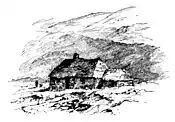154
ENGLISH SOLDIERS.
we all voted, and very likely with truth on our side, was the very place where our travellers had lodged. Talking of "far-off things," of Johnson and the copy of Cocker's Arithmetic which he gave to his landlord's "gentle and pleasing daughter," of her father's library of odd volumes, and of the old hut and the old life, an hour slipped quickly and pleasantly by.

THATCHED HOUSE.
As our travellers "passed on through the dreariness of solitude" on their way hither, they had come upon a party of soldiers working on the road, to whom they gave a couple of shillings to spend in drink. "With the true military impatience of coin in their pockets," these men had followed them to the inn, "having marched at least six miles to find the first place where liquor could be bought." There they made merry in the barn. "We went and paid them a visit," writes Boswell; "Dr. Johnson saying, 'Come, let's go and give 'em another shilling a-piece.' We did so, and he was saluted 'My Lord' by all of them." Johnson avows that one cause of his generosity was regard to his and Boswell's safety. "Having never been before in a place so wild and unfrequented, I was glad of their arrival, because I knew that we had made them friends; and to gain still more of their good-will, we went to them when they were carousing in the barn, and added something to our former gift." The money was ill-bestowed. "The poor soldiers got too much liquor. Some of them fought and left blood upon the spot, and cursed whisky next morning." Perhaps Johnson had them in his mind when, a few years later, he said, "Why, sir, a common soldier is usually a very gross man." To the degradation of one of the English regiments which had been stationed in the Highlands, testimony is borne by Wolfe, who on his return from Scotland in 1753, wrote: "If I stay much longer with the regiment I shall be perfectly corrupt; the officers are loose and profligate, and the soldiers are very devils."[1] Johnson soon found that he had no need of a guard. His host had indeed fought in the Highland army at Culloden, but he was a quiet honest fellow. The account which he gave of the campaign moved Boswell to tears. If he
- ↑ Wright's Life of Wolfe, p. 279.